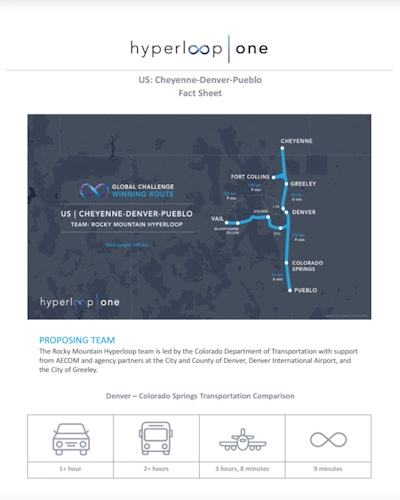The future of cargo and public transportation may be arriving in Colorado.
Colorado Department of Transportation RoadX Program Director Peter Kozinski said today that there’s now about an 85 percent chance that a magnetic levitation (mag-lev) propulsion system, or hyperloop, will be built in The Centennial State.
Kozinski said that he was only half-convinced two months ago that a vacuum-sealed tunnel network would be built in his state. A lot has changed since then including the state’s relationship with Hyperloop One, a rising star in the mag-lev industry which has successfully tested the technology and said it has the potential of jettisoning cargo and people up to speeds of 700 mph.
During a live Facebook forum today held by CDOT, Kozinski was asked by a viewer if he thought a hyperloop system would be built in Colorado.
“If you were to ask me that a couple of months ago, I would have put it at 50-50,” Kozinski said. “We were definitely recognized as one of the top 35 applications that went into the Hyperloop (One) challenge at a national level, but then we got announced as one of the top 10 and my percentages increased a little bit.”
Kozinski explained that he now believes that there’s an 85 percent chance that a hyperloop system will be built in Colorado. His confidence in Hyperloop One grew even more after learning that Virgin Group Founder Richard Branson had invested in the Los Angeles-based company.
After launching a global competition to seek out a site to build its mag-lev system, Hyperloop One was swamped with 2,600 submissions.
CDOT teamed up with private engineering firm AECOM on its proposal which calls for a 360-mile track from Denver International Airport with three legs headed to Pueblo, Vail or Cheyenne, according to the denverpost.com.
Current trip times would be drastically reduced with hyperloop. For instance, the normal 2 ½ hour trip from Denver to Vail would be shortened to roughly 8 ½ minutes.
However, Hyperloop One has not yet gotten a prototype up to the kind of speed that would provide such fast trips. In July, the company successfully tested a mag-lev pod at its Nevada test site. After running 1,433 feet, the pod reached a top speed of 192 mph.
Kozinski said hyperloop systems invite new inquiries into regulatory aspects of the promising tech. For instance, FAA governs air planes and FRA governs railroad, but it’s unclear at this point which agency would handle hyperloop transport.
There are also safety concerns regarding the high speeds of hyperloop travel leaving some proponents to suggest that it would be best to start with cargo transport first prior to shuttling people.
Hyperloop One reports on its website that it’s aiming to have an operational hyperloop system in place by 2021. The company is currently working with CDOT on a feasibility study.










